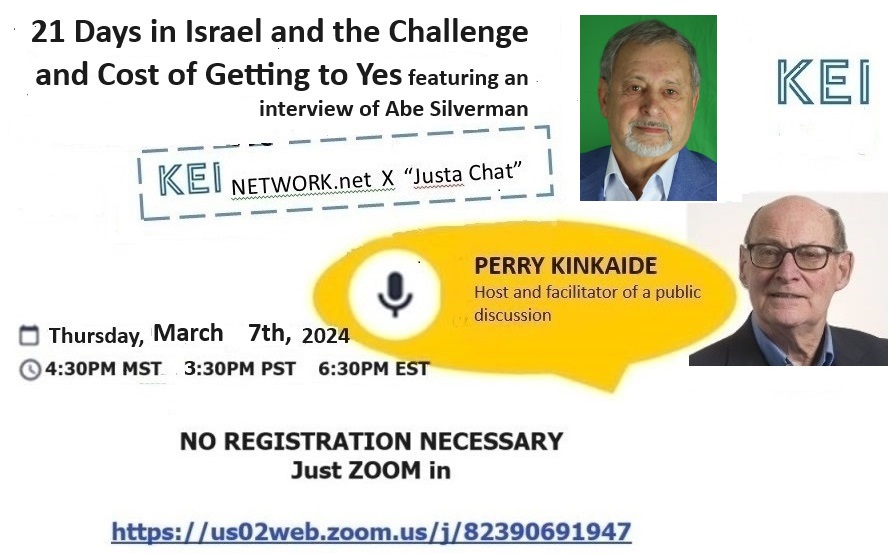
The recording of last week's webinar, "Good Governance - in Pursuit of Excellence", can be accessed HERE https://youtu.be/IWtb6OkfYVs The Executive Summary and highlights are HERE
Getting to Yes in the Middle East
In a devastating escalation of violence, the Middle East has once again been thrust into a dire humanitarian crisis. Discussing it can be testy as emotions are running high, though often without being well informed about the facts or the region's history. Hamas launched the conflict with a surprise and violent attack on Israel, leading to significant casualties and raising fears of the conflict engaging much of the Middle East. The operation, dubbed "Operation Al-Aqsa Flood," saw an extensive military engagement, with Hamas deploying thousands of rockets and conducting ground and naval operations. The attack led to over a thousand Israeli casualties and significant destruction in addition to Hamas taking men, women and many children hostage. - Continued below

Our next webinar "21 Days in Israel and the Challenge and Cost of Getting to Yes" features an interview of Abe Silverman who recently returned from a visit to Israel. You are invited to share your views and participate in what promises to be an inciteful presentation of his journey, interview, and follow-on discussion. Zoom in https://us02web.zoom.us/j/82390691947
Continued from above ... Israel's response, termed "Operation Iron Swords," targeted Hamas in the Gaza Strip, resulting in tens of thousands of Palestinian deaths and injuries including members of Hamas. This counter-assault has exacerbated an already tense and fraught situation, leading to widespread international concern and calls for restraint. The reasons behind Hamas' attack are multifaceted, rooted deeply in the longstanding and complex Israeli-Palestinian conflict. Hamas spokesperson Khaled Qadomi cited "atrocities" against Palestinians and violations at holy sites as triggers for their actions. This narrative underscores the deep-seated grievances and desperation among Palestinians but does not justify the use of violence against civilians.
The Israeli government, declaring a state of war, is taking significant military steps to defeat if not eradicate Hamas. Prime Minister Benjamin Netanyahu's office articulated this stance clearly, indicating a resolution for a decisive action against what it described as terrorist aggression. This has raised concerns about the conflict spiraling into further violence and civilian casualties.
The international community's reaction has been mixed, with widespread protests and expressions of solidarity for both Palestinian and Israeli victims. Governments worldwide, including those of the European Union, the United Kingdom, South Africa, and India, have condemned the violence, with varying degrees of support for Israel's right to defend itself. The situation's complexity inlcuding the humanitarian crisis in Gaza is mirrored in the diverse global responses, reflecting the deep international divisions regarding the Israeli-Palestinian conflict.
This tragic escalation serves as a stark reminder of the urgent need for a lasting resolution to the Israeli-Palestinian conflict. Getting to "yes", in how Palestians and Isaelis can live in harmony has been a continuing challenge at a horrendous cost to both parties. The cycle of violence only leads to more suffering and loss, underscoring the necessity for dialogue, understanding, and peace-building efforts. The international community must come together to support a sustainable solution that respects the rights and aspirations of all parties involved.
As we witness the unfolding tragedy, it is imperative for global citizens to advocate for peace, dialogue, and humanitarian support. Several nations in the Middle East appear ready to reconcile with Israel. The path to reconciliation is fraught with challenges, but through constructive discussion and concerted efforts, there is hope for a future where both Israelis and the Palestinians as well as their neighbours can live in security and dignity. - Editor@KEInetwork.net

Articles and discussions received from the Network this week
EMERGING TECHNOLOGIES. How not to miss an emerging technology: Disruptive business value: The trend can result in measurable value to the business. Independence: The trend allows the organization to work in smaller, more independent units. Connectivity: The trend reduces friction in the organization’s connectivity. Extensibility: The trend can broadly shape and improve the organization’s technology and management practices. HERE
ENERGY. Valav Smil anticipated the non-carbon energy transition. HERE Weekly global fusion news update - video. HERE What's wrong with wind and solar. HERE
CLIMATE CHANGE. CO2 Emissions hit record high in 2023 but clean energy limited the growth with advanced economies dropping to a level of 50 years ago. HERE Widespread electrification will increase demand for all forms of energy. HERE
ARTIFICIAL INTELIGENCE. Can AI chatbots be stopped from going rogue? HERE Using AI to close Canada's productivity gap. HERE
PUBLIC HEALTH. How Generative AI can improve health outcomes. HERE
MENTAL HEALTH. It is cool to be kind - the value of empathy explored. HERE Caution in expanding MAiD to include the mentally ill. HERE
GLOBAL ECONOMY. Mega projects sap Saudi Arabia's economy. HERE Manufacturing business activity in China continues to decline. HERE
DISCUSSION. Several rather testy discussions this week: 1. Apathy implies consent. Discussion - if someone is drunk or otherwise unconscious, is their behaviour consensual?, 2. When is social engineering not a municipal role?, 3. Should Alberta introduce political parties at the municipal level? and 4. Should Russia win? Discussion - Is the Ukraine getting what it deserves?
Editor@KEInetwork.net
KEInetwork.net



